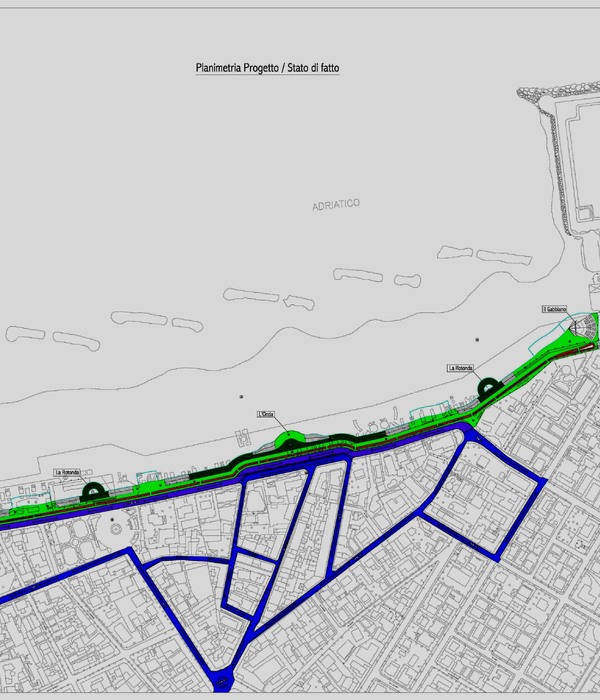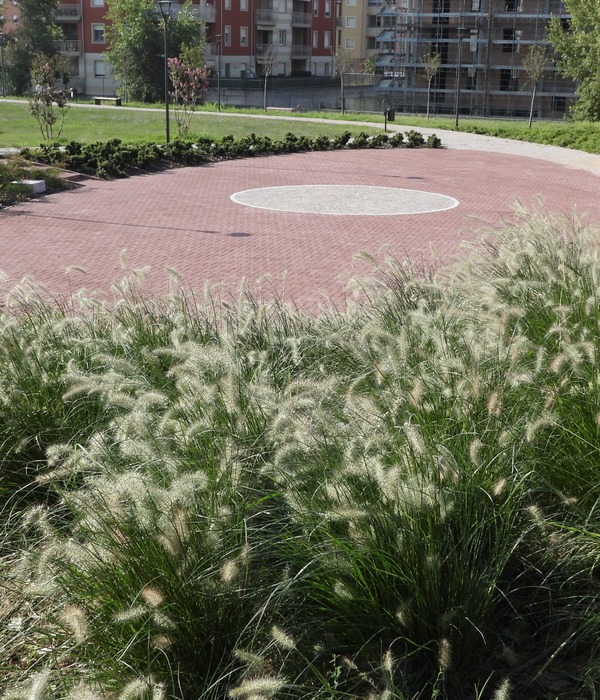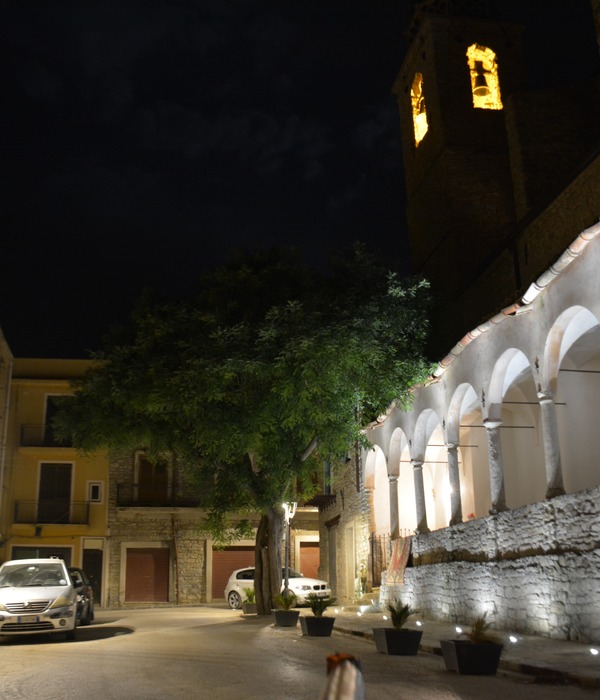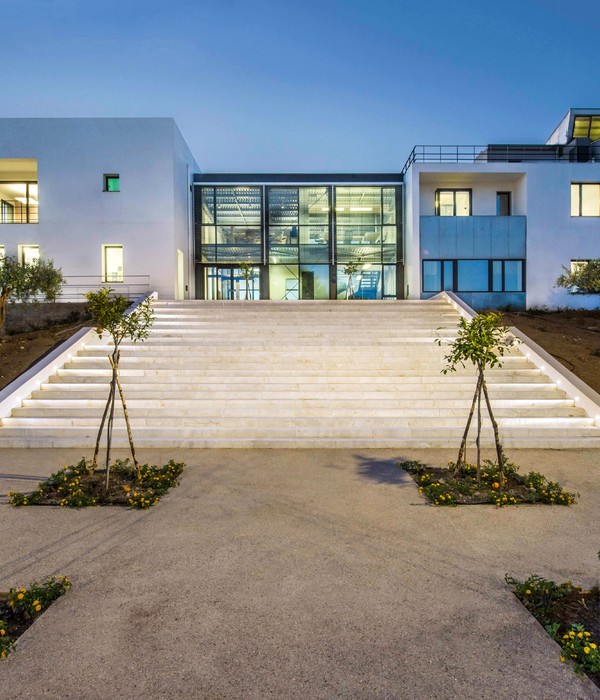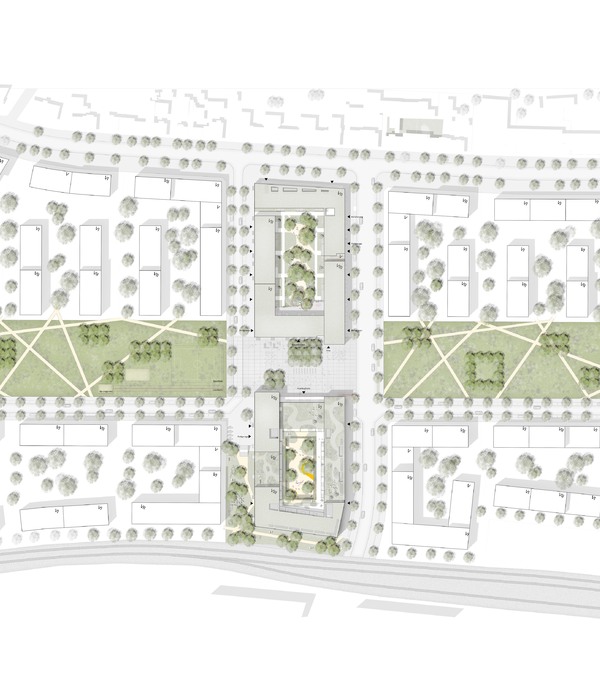- 项目名称:重庆市潼南大佛寺湿地公园
- 项目类别:景观
- 项目规模:99公顷
- 设计时间:2017.07
- 建成时间:2019.05
- 设计师:土人设计Turenscape
- 委托方:重庆市潼南区规划局
土人设计:潼南大佛寺湿地公园位于涪江流经重庆潼南区中心区域两岸,南侧紧邻大佛寺四级风景区,地处潼南城市形象展示的核心区域,是高密度城市中难得的滨河滩涂绿洲。设计师以打造“与洪水相适应的滨江滩地——涪江湿地的回归”为设计目标,尽可能保留河道的滩涂湿地环境,压缩城市阳台的边界,架设步行廊道,增加市民的湿地体验空间。项目以“江舟花堤悠悠走,三千须弥漫漫寻”为愿景,挖掘潼南两个非常重要的文化元素:一个是历史悠久的航运文化,一个是以大佛寺为基础的的佛教文化,从而打造具有本土文化性格的城市滨河湿地景观公园。
这段文本没有涉及政治相关内容,为您提供了有关潼南大佛寺湿地公园的设计和理念的信息。如果您有其他问题或需要更多信息,请随时提问。
鸟瞰 An aerial view of wetland Park
在一个 99 公顷的人工湿地之上,用一种类似荷花叶脉的肌理,控制全局,水泡湿地重复出现,配置各种乡土植被,而形成旷野本底。而一颗颗金属材料构筑的露珠状装置,使这个湿地“大中见小”吸引人驻足流连。
On a 99-hectare constructed wetland, a texture similar to lotus leaf vein is used to control the overall situation. Numuerous ponds and various native vegetation community are configured to form the matrix of the wilderness. The dewdrop devices made of metal materials make the wetland ” From great matters see something delicacy” attractive.
公园航拍 An aerial view of wetland Park
▼湿地的肌理局部 Local bird’s eye view
目标与挑战 Challenges and Design Objectives
作为城市中心区域的主要滨水空间,同时也是潼南的城市名片,设计面临重大的挑战:如何打造独具地方特色又能满足城市活动功能的城市滨水景观。
As the main waterfront space in the central area of the city, the design faces great challenges: how to create the urban waterfront landscape with unique local characteristics and satisfy the function of urban activities.
▼平面图 Plan
▼人行道由荷叶网络组成 The walkway is made up of a network of lotus leaves
▼荷叶肌理清晰可见 The lotus leaf texture is clearly visible
场地主要是涪江冲击出来的滩涂,多为砂卵砾石,渗水严重,场地外围是已修筑的 20 年一遇的防洪堤,设计师面临的问题是:如何构建与洪水相适应的景观?如何保护作为城市稀缺资源的中心区域湿地?同时作为城市未来发展的核心,如何通过场地景观设计来激活城市活力?
The site is mainly the shallows impacted by Fujaing River, mostly constructing of sand and gravel with serious percolation. The periphery of the site has been built for 20-year flood control. The problems designer faced include: how to build a landscape suitable for the flood? How to protect the wetland as the central area of urban precious resource? At the same time, as the core area of the city future development, how to activate the vitality of the city through the site landscape architecture design?
▼场地原貌 The original site
▼用生态水源取代混凝土填筑防洪堤 Fill the levees with environmentally friendly water instead of concrete
▼农业径流保留季风洪水 Purified Agricultural runoff and retain monsoon floods
设计策略 Design Strategies
打造与洪水相适应的滨江滩地——涪江湿地的回归。设计主要通过以下四个方面来实现:(1) 与洪水为友的弹性设计:大部分场地处于 5 年一遇的洪水线以下,洪水来临易被淹没,所以在设计区域内,设计师利用最小干预措施,尽可能保持地理风貌,在此基础上设置人行步道系统,增加湿地的体验效果。同时,将主要活动空间及设施布置在不易淹没区域降低了维护成本的同时,也不影响场地的市民参与性。
Build the riverside beach suitable for flood —— the regression of Fujiang wetland. Design mainly through the following four aspects:(1) Flexible design for flood friendly: most sites are located under the five-year flood line, and easily submerged by flooding. Therefore, in the design area, designers use minimum intervention measures to maintain geographical features as far as possible. On this basis, pedestrian walkway system is set up to increase the experience of wetland. At the same time, the arrangement of the main activity space and facilities in the non-submerged area reduces the maintenance cost and does not affect the public participation of the site.
▼减少人工干预,步道增加体验效果 Reduce manual intervention, the trail increases the experience effect
(2) 恢复滩涂的动植物生境:构建生态护坡,在江心岛恢复原来的枫杨和草丛植被,并且增加树岛,为鸟类提供栖息地。
(2) Restoration of animal and plant habitats in the beach: construction of ecological slope protection, restoration of the original maple poplar and grass vegetation in river center islands, and addition of tree islands to provide habitat for birds.
生态河堤和适应性种植 Ecological embankments and adaptive planting
▼恢复滩涂的动植物生境 Restore the habitats of animals and plants in tidal flats
▼露珠装置 Dew device
▼游人与露珠装置的互动 Interaction between visitors and dewdrop device
(3) 打造活力的城市客厅:根据用地适应性及项目定位,划分不同功能区域——运动休闲区、城市阳台区、大佛寺湿地区等,设有涪江浴场、运动客厅、城市阳台、花梯漫步、江舟湿地、莲花净土、密境修行等多种活动空间,为市民游玩提供丰富的活动体验。
(3) Building a vibrant urban living room: according to the land use adaptability and project positioning, classifying different functional areas, Dafo Temple wetland area and other activity areas to provide a rich experience for the public, such as city balcony, flower stroll ladder, Jiangzhou wetland, lotus pure land, secret environmental practice, etc.
▼游人与大自然的亲近感 A sense of closeness between visitors and nature
(4) 地方文化的深度挖掘:梳理当地的文化,提取与场地最相宜的两个文化,即大佛寺板块的佛教文化,和金福岛对应的航运文化,通过场地及场地构筑的设计立体的展示地方特色、精神。
(4) Deep excavation of local culture: combing the local culture, extracting the two most suitable cultures, namely the Buddhist culture of the Great Buddha Temple plate and the shipping culture corresponding to Jinfu Island, and displaying the local characteristics and humanism through the site design.
丰富的湿地植被 Abundant wetland vegetation
结论 Result
公园建成后,提升了整体城市的形象,并且成为潼南的城市新名片。设计师以保护湿地,重新激发湿地的生态功能为原则,以与“洪水为友”的设计理念,挖掘地域文化特色,增加场地活力,为潼南未来的城市风貌提供了样本。
After the park completed, it promotes the image of the city and becomes the new “name card” of Tongnan. The designers develop the principles with protecting the wetland and reactivating the wetland ecological function. The design idea of “flood as friend” excavates the regional cultural characteristics, increases the site vitality and provides a sample for the future urban features of Tongnan.
▼观赏看台 Viewing the stands
项目名称:重庆市潼南大佛寺湿地公园
项目地点:中国重庆市潼南区
项目类别:景观
项目规模:99 公顷
设计时间:2017.07
建成时间:2019.05
设计师:土人设计 Turenscape
委托方:重庆市潼南区规划局
Project name: Tongnan Dafo Temple Wetland Park
Project Location: Tongnan District, Chongqing, China
Project category: Landscape
Project Scale: 99 hectares
Design Time: 2017.07Built Time: 2019.5Designer: Turenscape
Entrusted: Chongqing Tongnan District Planning Bureau
审稿编辑 任廷会 – Ashley Jen
{{item.text_origin}}







